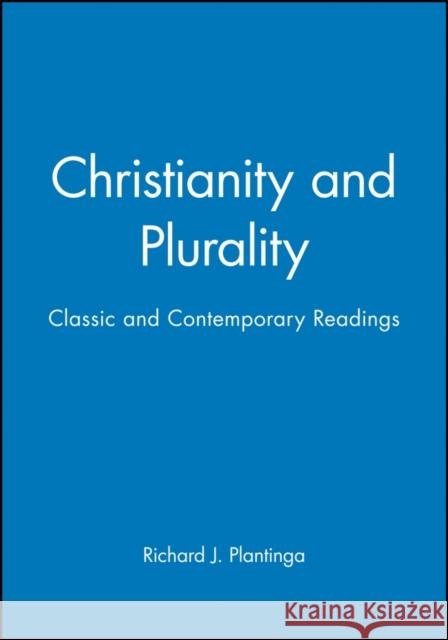Christianity and Plurality » książka



Christianity and Plurality
ISBN-13: 9780631209157 / Angielski / Miękka / 1999 / 392 str.
Christianity and Plurality
ISBN-13: 9780631209157 / Angielski / Miękka / 1999 / 392 str.
(netto: 230,06 VAT: 5%)
Najniższa cena z 30 dni: 239,10
ok. 30 dni roboczych.
Darmowa dostawa!
This selection of source readings brings together diverse materials from the Christian tradition in order to help students think theologically about the implications of religious plurality.
Acknowledgments.
1. Introduction: Religious Pluralism Old and New.
Part I: Biblical Texts:.
A. Old Testament:.
2. Genesis 1–3 (creation and fall narratives).
3. Genesis 9 (Noahic covenant).
4. Genesis 11–12, 15 (Abrahamic calling and covenant).
5. Ruth 1–4 (a non–Israelite′s adoption of the faith of the Israelites).
6. Deuteronomy 5 (law of the covenant).
7. I Kings 18 (the encounter of God and the gods).
8. Ezra [selections] (building of walls literal and otherwise to keep out non–Jews).
9. Esther 1–10 (a Jewess flourishes in a non–Jewish setting but rallies to the cause of her people).
10. Wisdom literature [selections] (human wisdom is esteemed, but the fear of Jahweh is the source of true wisdom).
11. Isaiah [selections] (judgement of the nations of the earth followed by promise).
12. Daniel 1–6 (a Jew is true to his faith in a foreign land and is blessed).
13. Amos 1–6 (judgement of the nations and of Israel).
14. Jonah 1–4 (God′s concern with nations other than Israel).
15. Micah 4 (the peoples of the earth walk in the name of their gods).
B. New Testament:.
16. The Gospels [selections] (life and ministry of Jesus).
17. Matthew 28 (the Great Commission).
18. John 1 (prologue concerning the logos).
19. John 3 (God′s love for the world and sacrificial gift for the world).
20. John 14 (intimate relations between Father, Son, and Spirit; bond of love between God and believing humanity).
21. Acts 14 (God′s universal witness).
22. Acts 17 (Paul on the Areopagus).
23. Romans 1 (universal natural knowledge of God).
24. Romans 2–3, 8–11 (the question of election).
25. I Timothy 2 (divine desire for universal salvation).
26. I John 4 (God is love).
27. Revelation 22 (the close of the Biblical narrative on an eschatological note).
Part II: Patristic Texts: .
28. Justin Martyr, ′The First Apology′.
29. Tertullian, ′The Prescriptions Against the Heretics′.
30. Origen, ′De Principiis′, Book I/6, Book III/6.
31. Augustine, ′On the Profit of Believing′.
32. Augustine, ′The City of God′, Book VI, Book VIII/1.
33. Athanasian Creed.
Part III: Medieval Texts:.
34. Anselm, ′Proslogium′.
35. Thomas Aquinas, ′Summa Theologiae′ I.1.1; I–II.109; I–II.112–114; II–II.2–10; II–II.81.
Part IV: Renaissance and Reformation Texts:.
36. Nicholas of Cusa, ′De Pace Fidei′.
37. John Calvin, ′Institutes of the Christian Religion′, Book I/1–10, Book II/2/12–27.
38. The Creed of the Council of Trent.
Part V: Modern Texts:.
39. Herbert of Cherbury ′De Veritate′ [selections].
40. Rene Descartes, ′Meditations on First Philosophy′ [selections].
41. G. E. Lessing, ′Nathan the Wise′ Act III, Scene 7.
42. Friedrich Schleiermacher, ′The Christian Faith′ 3–4, 6–12, 14.
43. Ernst Troeltsch, ′The Place of Christianity Among the World Religions′.
44. Karl Barth, ′The Revelation of God as the Abolition of Religion′.
45. Hendrik Kraemer, ′An Attempt at an Answer′.
46. Joachim Wach, ′General Revelation and the Religions of the World′.
47. Vatican II, ′Declaration on the Relationship of the Church to Non–Christian Religions′.
48. Karl Rahner, ′Christianity and the Non–Christian Religions′.
49. Paul Tillich, ′Christianity Judging Itself In the Light of Its Encounter With the World Religions′.
50. Paul Tillich, ′The Significance of the History of Religions for the Systematic Theologian′.
51. Stanley Samartha, ′Dialogue as a Continuing Christian Concern′.
52. Wilfred Cantwell Smith, ′The Christian in a Religiously Plural World′.
53. John Hick, ′Whatever Path Men Choose is Mine′.
54. John Hick, ′A Philosophy of Religious Pluralism′.
55. Lesslie Newbigin, ′The Gospel and the Religions′.
56. Peter Berger, ′God in a World of Gods′.
57. John Paul II, ′Crossing the Threshold of Hope′ [selections].
Further Reading.
Index.
Richard J. Plantinga is Professor of Religion and Theology at Calvin College, Grand Rapids, Michigan.
This selection of source readings brings together diverse materials from the Christian tradition in order to help students think theologically about the implications of religious plurality.
Beginning with the Bible, the volume goes on to present primary texts from the history of Christian thought, ranging from Justin Martyr in the second century to John Paul II in the late twentieth century. Whilst showing students that the issue of religious pluralism is not new, the selection accentuates discussions in the twentieth century in which this has become a pressing area of theological inquiry. The volume fosters a comparative approach by including the works of major Catholic and Protestant thinkers.
1997-2026 DolnySlask.com Agencja Internetowa
KrainaKsiazek.PL - Księgarnia Internetowa









